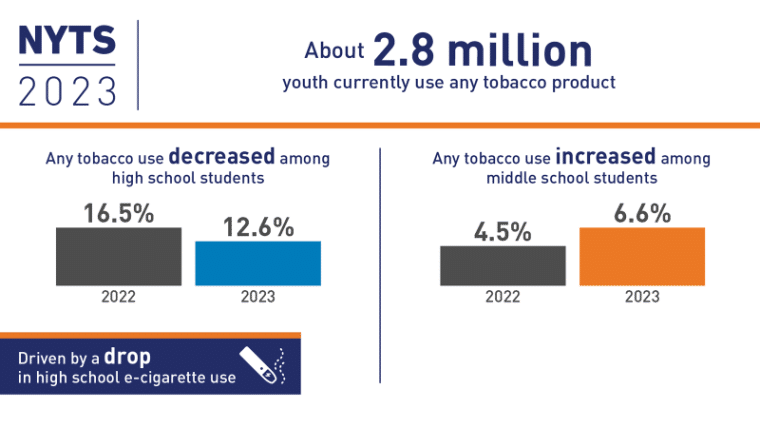Phillip Morris International announced on Monday that it will temporarily suspend all online sales of its popular Zyn nicotine pouches via the Zyn.com website in the United States after its subsidiary, Swedish Match North America (SMNA), received a subpoena from the Attorney General of the District of Columbia.
It appears that SMNA may have violated a ban imposed on the sale of flavored nicotine products in D.C. back in 2022.
“Swedish Match is conducting a full review of its sales and supply chain arrangements in D.C. and other U.S. localities where flavor bans may apply and is temporarily suspending all sales on ZYN.com until that assessment is complete,” the company said in a statement.
D.C.’s 2022 law bans the sale of all flavored tobacco products, including flavored synthetic nicotine pouches such as Zyn. The reason for these flavor bans is to make nicotine products less attractive, particularly to young users. Flavors like mint, fruit, and dessert can hide the strong taste of nicotine, making them more appealing, especially to younger audiences.
Phillip Morris said that it is cooperating with D.C. authorities and that its preliminary investigations point to violations of the provision against the sale of flavored products by certain online marketplaces and independent retailers. The company could face severe economic penalties if these violations are proven.
Shares of PMI are dropping by nearly 3% in pre-market stock trading action this morning following the news, possibly as investors are concerned about the ripple effect of this halt including further action taken by regulators and attorney general offices from other states.
What are Nicotine Pouches and Why Do People Love Them?

Nicotine pouches are similar to a small bag of tea. They are designed to be placed between the lips and gum to absorb the chemical. One of the most appealing characteristics of this product is that it is discreet compared to other presentations of oral tobacco.
Zyn and Velo – from British American Tobacco – are the most popular brands of nicotine pouches. They have grown in popularity in the past few years and are one of the fastest growing segments of the tobacco industry as consumers continue to move away from traditional cigarettes.
“Zyn is marketed by Philip Morris International to adult tobacco users. Although it doesn’t contain tobacco, U.S. regulators still treat it as a tobacco product,” explains a recent report from the Associated Press on the product.
Part of Zyn’s tremendous success seems to be tied to the proliferation of thousands of Zyn memes. Social media users like to joke about their love of the pouches and that has become a major marketing boon for the company. However, it could become a major problem because this kind of viral marketing often works best on young people. If kids get caught up in the memes and get addicted, the brand may come under fire from regulators and parents before too long.
Whoso restoreth the Zyn supply line and bringeth the nicotine to the boys, is rightwise Christian Prince born of all New Christendom. pic.twitter.com/5mE8OBwHDK
— William Swollace (WBS Edition) (@WBS_Meme_King) June 18, 2024
Another Five States Could Rally Against Phillip Morris’ Zyn Sales
Philip Morris’ Swedish Match subsidiary is conducting a thorough review of its distribution and supply chain for Zyn products in jurisdictions with flavor bans. All sales on Zyn.com have been halted until this assessment is complete. The company expects that this will take at least a few weeks.
The sale of Zyn via the website represents a “small percentage” of the brand’s nationwide turnover. However, analysts comment that the decision could have unexpected and wider legal consequences.
There are currently over 400 localities and five states with some form of flavor ban that could pursue similar enforcement actions if they find Zyn or other brands are selling banned flavored products in their jurisdictions.
“A valid question will be how many sales come from other online platforms and independent retailers that are not only selling into DC, but also potentially other states/localities that have flavor bans,” said Jefferies analyst Owen Bennett.
If the evidence points to these sales being a “common occurrence”, Bennett believes that Philip Morris may need to take broader actions to tackle the issue, which could ultimately have a “more meaningful” for the Zyn brand’s growth trajectory.
FDA Blasts Retailers with $55,000 in Fines for Selling Zyn to Underage Consumers
The Federal Drug Administration (FDA) recently issued dozens of warning letters and 41 money penalty complaints amounting to $55,000 against retailers that had reportedly sold Zyn pouches to underage consumers between October 2023 and February 2024.
“Although currently available data do not show that youth use of nicotine pouches has increased, FDA remains concerned about any tobacco product that may be appealing to youth and we will continue to closely monitor youth use of these products,” said Brian King, director of the FDA’s Center for Tobacco Products in a statement published by the agency in April this year.
“Youth use of any tobacco products, including nicotine pouches, is unsafe. These products contain nicotine, which is highly addictive, can harm adolescent brain development, and can adversely impact attention, learning, and memory,” the agency’s press release further stressed.
A Divisive Debate Over Nicotine Pouches
The popularity of nicotine pouches, particularly Zyn, has resulted in a heated debate regarding these products and the risks they pose to consumers compared to traditional tobacco.
Some experts believe that they are a lower-risk alternative compared to gums or patches as they lack many of the carcinogens found in tobacco products used as substitutes for cigarettes.
Studies from Sweden have shown that these products are less likely to produce lung cancer and other similar diseases associated with tobacco consumption while the FDA also found in 2019 that a similar product called snus contains fewer chemicals that cause cancer than cigarettes.

Critics argue that nicotine is highly addictive and can harm the development of adolescents’ brains. They are concerned that the availability of products like Zyn in flavors that make them appealing to the youth could spark a new epidemic of nicotine addiction among young people, as happened with the e-cigarette company Juul.
The rise of Zyn memes and videos of popular influencers using the drug is reminiscent of Juul’s explosion in popularity with young people in the 2010s. This wave could result in further scrutiny and may lead to widespread bans if legislators believe that are harmful to public health.
Phillip Morris’s $16 Billion Bet is On the Line
Data compiled by federal agencies in the United States indicate that just 1.5% of high and middle school attendants consume nicotine pouches. This is significantly lower than the 10% of young folks who reportedly smoke cigarettes.
As the investigation in D.C. unfolds, the future of Zyn is on the line as other Attorney Generals from the states where flavored nicotine products are prohibited could also rally against the company.
Phillip Morris acquired Swedish Match in 2022 for $16 billion as part of its ongoing pivot to alternative products amid a shift in consumer preferences and hostile regulatory actions against traditional tobacco consumption.
Further restrictions on the sale of flavored nicotine pouches could significantly affect the revenues the company will obtain from Zyn products in the United States.
Hence, this multi-billion bet on nicotine pouches could fail to deliver the expected results if regulators determine that these novel products pose unacceptable public health risks.